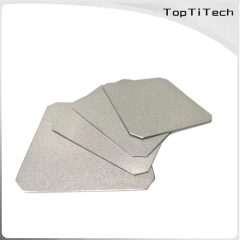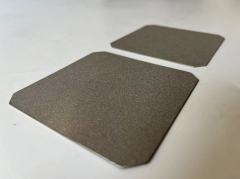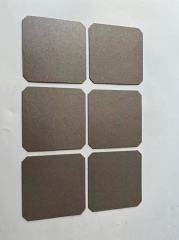


Ti-Based Gas Diffusion Layer Anode Titanium GDL
| Min. Order: | 1 Piece/Pieces |
|---|---|
| Trade Term: | FOB,CFR,CIF,DAT,FAS,DDP,DAP,CIP,CPT,FCA,EXW |
| Payment Terms: | Paypal, L/C, T/T, WU |
| Supply Ability: | 500000 pieces/week |
| Place of Origin: | Shaanxi |
Company Profile
| Location: | Baoji, Shaanxi, China (Mainland) |
|---|---|
| Business Type: | Manufacturer |
Product Detail
| Model No.: | TF-19 |
|---|---|
| Means of Transport: | Ocean, Air, Land |
| Brand Name: | TopTiTech |
| Product Name: | Ti-Based Gas Diffusion Layer Anode Titanium Gdl |
| Material: | Titanium Powder |
| Size: | customized |
| Filter Precision: | 0.2-100μm |
| Porosity: | 30%-40% |
| Operating Temperature: | ≤600℃ |
| Technique: | Powder sintering |
| MOQ: | 1 Piece |
| Packing: | wooden box, carton box |
| Production Capacity: | 500000 pieces/week |
| Packing: | Standard packing |
| Delivery Date: | 3 days for ready goods, 15 days for OEM |
Product Description
Product Introduction
Metal porous titanium plates are primarily used in standard PEM electrolyzer single cells and stacks as the flow field or diffuser material, particularly on the oxygen (anode) side. Electrolyzer hardware cannot use carbon-based gas diffusion layers (GDLs) at the anode because the carbon will immediately oxidize to CO2 (if the medium is acidic) or carbonate ions (if the medium is basic) during the reaction.
Porous titanium plates are an excellent option for a diffusion medium in various applications, including electrolyzers and fuel cells. TOPTITECH´s porous metal gas diffusion layers are the top choice for achieving high performance in these applications. The uniform porosity, strength, and corrosion resistance outperform other diffusion layer productsTOPTITECH substrates are available in a variety of alloys to support a full range of fuel cell operating temperatures, and can be coated with surface treatments or catalyst layers to enchance performance.
In an electrolyzer, why not utilize a carbon-based Gas Diffusion Layer?
Using a carbon-based gas diffusion layer (GDL) in an electrolyzer can pose several challenges. The presence of oxygen ions and voltage on the anode side of the electrolyzer can cause the carbon in the GDL to be oxidized, resulting in the generation of CO2 gas. While this can initially lead to a lower electrolysis voltage, the consumption of the carbon GDL is a short-lived phenomenon. As a result, the stack compression decreases, leading to higher resistance and lower performance. Therefore, it is not advisable to use a carbon-based GDL in an electrolyzer.
Parameters
Place of origin: Baoji, China
Brand: TOPTITECH
Filtration precision:0.2um-100um
Material: titanium
Working temperature:≤ 300℃
Length: 30-1000mm(More than 1000mm can be welded)
Thickness: ≥0.5mm
FEATURES
High corrosion resistance: Titanium is a highly corrosion-resistant material, making it suitable for use in harsh environments.
High strength-to-weight ratio: Porous titanium plates are lightweight yet strong, making them ideal for applications where weight is a concern.
High porosity: The porous nature of titanium plates allows for efficient diffusion of gas, making them well-suited for use in electrolyzers and fuel cells.
Customizable properties: The pore size and distribution of porous titanium plates can be tailored to meet specific application requirements, allowing for greater flexibility in design.
Excellent thermal conductivity: Titanium has a high thermal conductivity, which allows for efficient heat transfer and thermal management in fuel cells and electrolyzers.
Long service life: Due to its corrosion resistance and durability, porous titanium plates have a long service life, reducing maintenance and replacement costs.
Ease of manufacturing: Porous titanium plates can be manufactured using a variety of techniques, including sintering, powder metallurgy, and electrochemical etching, making them easy to produce in large quantities and at a reasonable cost.
Applications for porous titanium plates:
Energy storage and generation: Porous titanium sheets can be used as gas diffusion layers in fuel cells and electrolyzers for energy storage and generation. The high porosity and thermal conductivity of titanium allow for efficient gas diffusion and heat transfer, improving the performance of these devices.
Chemical processing: Porous titanium sheets can be used in chemical processing applications, such as catalyst supports and filtration media. The high corrosion resistance of titanium makes it suitable for use in harsh chemical environments.
Water treatment: Porous titanium sheets can be used in water treatment applications, such as desalination and wastewater treatment. The high corrosion resistance and biocompatibility of titanium make it suitable for use in contact with water and other liquids.
Electronics: Porous titanium sheets can be used in electronic applications, such as printed circuit boards and heat sinks. The high thermal conductivity of titanium allows for efficient heat dissipation, while the porous structure can be used to create microfluidic channels for cooling.
Automotive: Porous titanium sheets can be used in automotive applications, such as exhaust systems and catalytic converters. The high corrosion resistance and thermal stability of titanium make it suitable for use in high-temperature environments.
Package and Shipment
1. Sintered Filters are usually packed in cartons, wrapped in soft film, and fixed in a box filled with industrial foam cotton, and the outer baler is packed with plastic bags with no damage during transportation.
2. Wooden box export packaging can also be customized. The foam cotton can be filled and fixed, the external box is sealed, the bottom is specified, the whole packaging is processed, and the goods can be delivered to the customer's designated place without damage.
Contact Us
+8619992203758
Company: TOPTITECH _ BAOJI YINGGAOCO., LTD
ADD: No. 195, Gaoxin Avenue, High-tech Development Zone, Baoji City, Shaanxi, China

